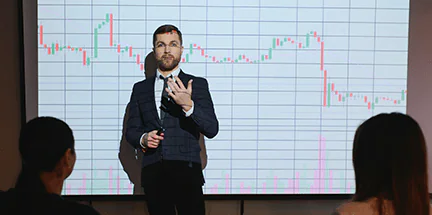Nearest Edge


Investing is an art. Just as there are different forms and styles of artists showing off their skills, there are also various types of investors. Depending on one’s goals, there are various investment strategies available. Anyone can make a suitable choice when they know how the investment scene works.
Nearest Edge is a gateway website that connects individuals who wish to learn investing to suitable investment education firms. No one started investing as an expert. At Nearest Edge, we play our role in the investment landscape by advocating for more people to learn how to invest.
People with zero investment knowledge can link up with tutors who specialize in teaching beginners investing. We also cater to intermediate and expert investors who wish to improve their investment knowledge. All of this is what Nearest Edge offers for free. Sign up to get started.

People with no idea what investing entails can start from the beginning and study their way to making informed choices. By connecting to a suitable tutor via Nearest Edge, they can learn investment fundamentals, risk and reward dynamics, how risk affects investments and the role of investment strategies.
Nearest Edge does not only connect beginners to appropriate tutors. We assign learners at any level to appropriate tutors.
Investors who already know the fundamentals but wish to brush up on advanced concepts can connect with tutors who can handle their classes.
Anyone can use our services at Nearest Edge. If they are interested in learning to invest, Nearest Edge will assign them to a tutor who can meet their learning needs.
The best part is that Nearest Edge is completely free. There are hidden charges for our services. Connection to suitable investment tutors via Nearest Edge is free.

Anyone can sign up on Nearest Edge by providing personal details like their name, phone number, and learning preferences.
When individuals sign up with Nearest Edge, that is a guarantee that they will be connected to an investment education firm based on their learning preferences.
After the connected firm has been confirmed, reps are assigned to each user to ensure their smooth onboarding process. Once that is done, investment education may begin.
At Nearest Edge, we encourage people to learn investing. It is important to see the bigger picture before throwing hard-earned money into any financial asset. People can learn to break down investment fundamentals and apply investment strategies when they sign up for an investment education.
These days, however, there are more avenues for people to invest than for people to learn how to invest. The team behind Nearest Edge has recognized this imbalance in the investment landscape. We advocate for more people to learn to invest. We connect interested people to investment tutors for free.

People have access to most websites according to their region. In most cases, there is a similar website for each service. But in Nearest Edge’s case, there is only one Nearest Edge. It means that individuals from around the globe who wish to learn investing can connect only through Nearest Edge.
The investment landscape is a dynamic environment. It is home to various financial instruments like real estate, ETFs, cryptocurrencies, and equities. There are markets and investment strategies that intersect for investors to choose from. Each financial instrument has its unique risks and rewards. Investors need to understand these components if they must navigate the investment landscape.
Individuals may participate in the investment landscape by allocating capital to assets they believe will yield gains. Informed investors analyze market trends, economic indicators, and individual company performance investing. Informed investing requires a mix of knowledge, strategy and timing. Nearest Edge connects the average person to tutors who can teach them how to make investment choices. Sign up for free.
The investment landscape constantly evolves. Technological advancements and global economic shifts influence the markets. It is crucial for investors to know when to take chances and when to manage risks. Understanding the broader context allows investors to make more strategic choices. Start the journey to investment literacy with Nearest Edge.

Various investors have coined multiple investment concepts over time. We will highlight some recurring important ones. Concepts like diversification, risk management, and compounding are fundamentals of informed investing. Diversification is when investors spread their investments across different assets to reduce risk.
Risk management focuses on identifying and mitigating possible losses. Compounding involves reinvesting earnings for possible exponential growth over time. Principles surrounding market cycles and the impact of inflation on investments also exist. Understanding these principles can help investors navigate the complexities of investing.
Dollar-cost averaging is an investment strategy where an investor consistently buys a fixed dollar amount of a particular investment, regardless of its price. The idea behind this approach is to reduce the impact of volatility by spreading the purchase price over time and possibly lowering the average cost per share.
Liquidity is the ease with which an asset can be quickly converted into cash without crashing its market price. High liquidity means an asset can be sold rapidly. Low liquidity may result in longer selling times and lower prices. Understanding liquidity is important if investors wish to manage their portfolios.
Rebalancing is the process of realigning the weightings of a portfolio's assets. Investors periodically buy or sell their investments to maintain a desired asset allocation. For instance, if one asset performs well, rebalancing would involve selling off some of the said assets and buying other assets to restore the original allocation.
Return on investment is used to evaluate investment activities. ROI is calculated by dividing the net gains by the initial investment cost and is expressed as a percentage. This investment metric helps investors compare different investments.
Investment risks refer to the likelihood of losing money when investing. There are various investment risks at different levels. Examples include market volatility, economic downturns, interest rate changes, and inflation. People must understand how risk affects investments to manage their portfolios.
A common strategy to mitigate risk is diversification. Investors can diversify across different asset classes, industries, and geographies. It helps to reduce the impact of any single investment's poor performance on the overall portfolio. Nearest Edge connects eager learners to suitable tutors who can teach them about investment risks. Sign up for free.

Technology, since its advent, has changed the face of investing forever. Investors use tech to get real-time market data that can help them to make informed investment choices.
Unlike when people had to buy stock and bonds manually, there are now online trading platforms everywhere, making buying and selling financial assets more seamless and convenient.
Investors can now learn information on social media and other online communities, which helps them stay on top of the financial scene.

Financial markets are platforms where individuals and institutions can trade financial assets. Examples of assets that can be bought and sold in financial markets include bonds, currencies, stocks, and commodities. These markets facilitate the flow of capital and enable price discovery. They are essential for the functioning of modern economies. Learn more about financial markets with Nearest Edge. Sign up for free.

The stock market is where investors or entities publicly trade company shares. This market helps investors purchase ownership stakes in companies. In this market, investors may earn from dividends or capital gains.
In this financial market, investors buy and sell debt securities. Governments and corporations issue bonds to raise capital. Investors may earn in the bond markets through regular interest payments.
This market is the global marketplace for trading currencies. As the world's largest financial market, investors and governments exchange one currency with another. Gains may be made from currency fluctuations.
This digital financial market is where crypto coins are traded. This market operates on the blockchain technology and is highly volatile.
Financial contracts are traded in this market. These contracts get their value from underlying assets like currencies and commodities.
Investors trade on raw materials in commodity markets. Examples of these include gold, oil, and agricultural produce. Investors trade in this market through futures contracts and options. These may hedge against inflation.
Rome wasn’t built in a day, yes. But the people who did build it had to start somewhere. The same goes for anything new that one wishes to try out. It seems unfamiliar and difficult at first, but things may ease with time. Nearest Edge is telling people investing isn’t so different. Once learned, investing is a skill that stays with a person for a long time. Start learning how to make informed decisions. Sign up with Nearest Edge for free.

| 🤖 Cost to Join | Sign up at no cost |
| 💰 Service Fees | Absolutely no charges |
| 📋 Enrollment Process | Quick and easy sign-up process |
| 📊 Learning Areas | Training on Crypto, FX Trading, Equity Funds, and More |
| 🌎 Regions Served | Serviceable in almost all nations but not in the USA |


